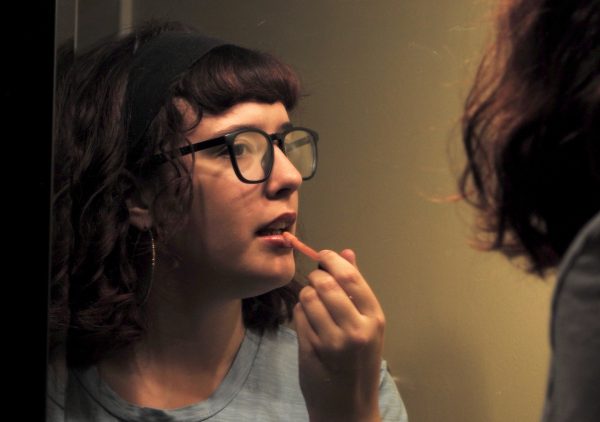Let me be clear
Popular prescription drug Accutane treats acne but comes with significant side effects
photo by Andrew Wilson
The prescription drug Accutane provides many with cleared skin but has its share of severe side effects. While many found the drug to be beneficial to their skin, side effects such as dry lips, nosebleeds and even anemia made it hard to outweigh the negatives.
Starting his morning routine, John* washes off his tretinoin cream from the night before with his salicylic acid cleanser. Walking out of the bathroom, he grabs a prescription box that contains red pills—the most important step of his skincare routine. While many can get by on drugstore products and pimple patches, John had to take it a step further. After going through countless other treatments and remedies to treat his acne, John was left with a final solution: Accutane.
“Basically it is like the last resort because it is kind of intense,” John said. “I went through a couple of other medications like tretinoin and antibiotics, and when that didn’t work, they put me on Accutane.”
Side effects
Isotretinoin, better known as Accutane, is a form of vitamin A taken daily to clear cystic acne or other severe skin conditions. While the medication has close to a 50% success rate, according to the American Osteopathic College of Dermatology, the pill is notorious for its severe side effects and health risks.
“The side effects were pretty brutal. Pretty much everything is dry even with moisturizer. I had dandruff, dry face, chapped lips all the time, bloody noses and even my mouth was dry really often,” John said. “Whether it outweighs the benefits kind of depends, it did work for a while, but then I just got acne again.”
According to drugwatch.com, the most common side effect is dry lips, which 90% of patients experience, followed by 80% of users developing dry skin, itching and consistent nosebleeds. These symptoms develop within the first two to four weeks on the medication, and Norris Dermatology states this is primarily due to reducing oil gland secretion, which can lead to overall dryness.
“It definitely did mess with my confidence a little bit because, I mean, no one really wants to walk around with chapped lips 24/7,” John said. “Most of my time on Accutane was pretty awful, I will say that.”
Severe risks
However, dry lips and nosebleeds are not the worst effects that can be experienced, as 1 in 500 Accutane users will experience severe side effects, including birth defects, premature birth, miscarriage, Inflammatory Bowel Syndrome and suicidal thoughts.
Accutane has also been linked to causes of anemia, a reduction in the number of one’s red and white blood cells. This condition can cause patients to experience severe exhaustion and fatigue, affecting their ability to perform normal day-to-day tasks. Medical News Today reports that 1 in 10 Accutane patients may develop anemia, a fact Jane* experienced firsthand.
“[Anemia] was very draining and taxing on my health because it takes so much out of you,” Jane said.
Besides the development of anemia, Jane was met with another potential health risk due to the prescription, one that half of Accutane patients face.
The bottle’s label contains a warning that the medicine has an extremely high risk of severe birth defects. While commonly only 3-5% of pregnancies result in birth defects, 35% of infants who have been exposed to Accutane during the pregnancy have been diagnosed with a birth defect. The most common birth defects attributed to the drug are hearing and vision impairments, heart deformities, cleft palates and abnormally shaped heads, which are illustrated on the packaging. As 50% of Accutane users are females of child-bearing age, the iPLEDGE program was created to require monthly pregnancy tests for patients. Although this program has decreased the number of Accutane-caused birth defects, the company still advises female patients to go on birth control pills as a precaution, which brings difficult decisions for patients and families.
“My parents thought 15 was too young for birth control, and if I went on it there’s no going off,” Jane said.
Along with required pregnancy tests, patients are also required to have their blood drawn to observe their overall health and wellness while on the medication. While patients may have observable side effects through blood work, many face struggles with their mental health during the process.
“Accutane definitely messed up my hormones so I have more mood swings, anemia, fatigue and anxiety, which is why it’s such a risky medicine to be on and why it requires getting your blood drawn every month to make sure you’re okay,” Jane said.
Different results
Even with all of the side effects and extra treatments, some patients only experienced clearer skin for a short period before their acne returned, even forcing some to go back on the treatment a second time.
“I was on Accutane for two six-month spurts because it didn’t work the first time. I am pretty sure most people don’t go on it twice but my skin is just like that,” John said. “[When I was] off of Accutane, obviously the side effects went away, but so did clear skin. I got acne again a few months after being off of Accutane both times, and they won’t do another round since it is heavily regulated by the government because of fertility side effects.”
Other patients, such as Jane, did not only continue to experience acne after treatment but observed changes in their overall skin texture and type.
“I was on it for eight months and fully cleared my skin for about four months, but now I have acne again but in different places because it changed my skin type,” Jane said. “It really dries out your skin and changes it, like I had oily skin and now my skin is dry, but I don’t think that should stop people from taking it because it works eventually.”
Despite many still experiencing acne after treatment, 99% of patients see lasting improvements in their skin, according to the Los Angeles Times.
“My skin does respond a lot better to other medications now [and] is almost clear after being on a tretinoin cream for almost five months, which didn’t work at all the first time I used the cream,” John said.
A poll on the Hagerty Journ Instagram showed that 75% of Hagerty students say they have struggled with their skin and 16% have gone on Accutane, so it is important to remember that no matter the result of treatment, the main goal is for students to feel more confident and comfortable in their own skin.
“My skin definitely put a damper on me most of the time because I thought it was the only thing people could see, so I would wear a bunch of makeup every single day. When my skin is clearer I feel happier and less insecure,” Jane said. “I would recommend to people that are struggling with their skin to remind themselves that everyone has or has had acne—it’s a normal occurrence.”
*names changed for privacy
Your donation will support the student journalists of Hagerty High School. We are an ad-free publication, and your contribution helps us publish six issues of the BluePrint and cover our annual website hosting costs. Thank you so much!







